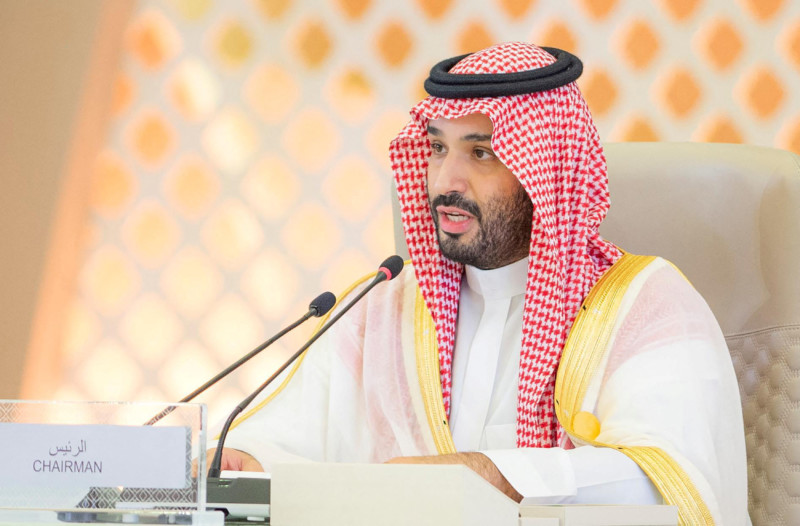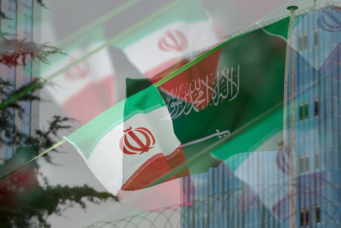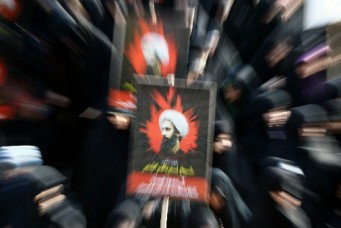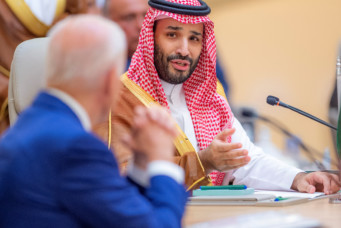The Saudi Gambit in Washington

Saudi Arabia is in a position to become a major international player but to sustain such a role it needs to consolidate its leadership in the Middle East.
The Arab Summit, which concluded in Jeddah last weekend, may well have just confirmed the Kingdom’s leadership of the Arab World. But now Riyadh needs to transform that into a regional leadership role.
Such a regional undertaking requires—in addition to taking the lead on the political settlement of the various crises that have plagued the region—the sagacious management of its relationships with both the United States and Israel.
It is therefore not surprising that the Kingdom’s foreign policy has lately been attracting considerable attention, especially with the mounting speculation that the United States desires to reduce its footprint in the Middle East.
The United States cannot entirely disengage from the Middle East, but will more likely seek to reduce its military commitments. That may be possible by transforming its military posture into one of “over the horizon” through its air force and navy which would ultimately require the cooperation of its regional allies.
This is exactly what Washington is trying to do by encouraging the establishment of a regional security system with a regional air-defense cooperation arrangement as a starting point. That is the rationale behind Israel’s March 2022 initiative—with strong US backing—to establish the Negev Forum (comprising Israel, the United States, Bahrain, Egypt, Morocco and the United Arab Emirates) as a politico-military arrangement against Iran.
Although the forum has held several meetings, there is no discernible progress. Moreover, Morocco—in response to the mounting repressive policies of the new Israeli government against the Palestinians—has postponed the next meeting of the Forum indefinitely. More importantly, Saudi Arabia is not a member and without its participation, the Forum faces an uncertain future.
It is within this context that we should consider the conditions that Saudi Arabia is reported to have conveyed last January to Washington for normalizing its relations with Israel.
The conditions, as reported in both the Wall Street Journal and the New York Times, are summarized as follows: U.S. support for a Saudi peaceful nuclear program, U.S. security guarantees, and privileged Saudi access to U.S. arms.
Rather interestingly, both newspapers underlined the fact that there was no mention of the Palestinian problem. While Saudi Arabia has not commented on the matter, these conditions are probably part of a larger package of which the upholding of Palestinian rights is a basic element as confirmed by the Saudi Foreign Minister late last January at a Davos meeting when he announced that “True normalization (with Israel) and true stability will only come through… giving the Palestinians a state”.
Moreover, the Jeddah Declaration adopted by the Arab Summit, confirmed the centrality of the Palestinian issue to all Arabs and underlined the necessity of implementation of the Arab Peace Initiative.
By choosing to lay out these conditions, Riyadh is indicating to Washington that Saudi normalization with Israel comes with its price—a special status for the Kingdom that is on par with Israel in the region.
Saudi Arabia has lately demonstrated its leadership abilities in multiple fora and across a broad range of issues. Whether these are in the energy market or at the G20, it has also skillfully managed its relations with China, Russia, and the United States. Most recently, the crisis in Sudan has provided Riyadh an opportunity to redress the criticism it has suffered concerning its record on human rights. By providing humanitarian assistance, in particular by evacuating many nationalities from Sudan, Riyadh has no doubt improved its image on the international stage.
A Saudi-led Middle East?
But to sustain such a policy, Saudi Arabia needs to demonstrate leadership in the Middle East. This requires taking the initiative on a host of issues, in particular in resolving the crises in Yemen, Syria, Libya and Sudan, and ending the political impasse in Lebanon. It also needs to be active on the Palestinian front. Moreover it needs to help Arab countries articulate a vision for a regional security system.
Presently, it has intensified its fence-mending efforts in Yemen and has indicated that it is prepared to do so in Syria. Unfreezing Syria’s participation in the League of Arab States and receiving President Assad at the Arab Summit in Riyadh—together with Summit decisions on Syria—is an indication that Saudi Arabia is keen on contributing to a political settlement in Syria. Riyadh has also shown interest in bringing about Palestinian rapprochement by recently receiving in Riyadh both President Mahmoud Abbas and a delegation from Hamas.
But the Saudis also need to manage their relations with the main players in the region. The Kingdom has already normalized its relations with Turkey and has agreed to do so with Iran. It now needs to manage its relations with Israel, which is particularly important because of its implications for the resolution of the Palestinian problem as well as for the prospects of a regional security system.
Given Saudi Arabia’s rising confidence and ambition, it is highly unlikely that Riyadh would acquiesce to Israel as the dominant economic and military power in the region. Normalizing with Israel under the prevailing conditions, would merely perpetuate Israel’s advantages in the region.
This, then, places particular importance on the conditions for normalization with Israel.
A Saudi Nuclear Program
Requesting US support for a peaceful nuclear program may no longer have practical value because the Americans are no longer the main source of this technology. In fact, Russia over the past few years has become a major international player in the export of nuclear technologies. China, meanwhile, has also been providing important services, particularly in the area of uranium mining and production of yellow cake—an important factor in producing nuclear fuel.
What the Saudis probably seek from the US is both political and technical support. More precisely, this support translates into Washington’s acceptance of Riyadh’s insistence on the complete control of the nuclear fuel cycle.
The Saudi Oil Minister declared last January at a mining industry conference in Riyadh that Saudi Arabia seeks to possess “the entire nuclear fuel cycle which involves the production of yellowcake, low enriched uranium and the manufacturing of nuclear fuel”.
Some would argue that such a Saudi condition would pose proliferation risks. But why should Saudi Arabia be treated differently from Argentina, Brazil, Iran, Japan and the Netherlands who currently have enrichment activities?
Moreover, Saudi conditions may even extend to reprocessing spent fuel. Again, there are non-nuclear weapon states that have this capacity—such as Belgium, Italy, Germany and Japan. Like these countries, Saudi Arabia is party to the Nonproliferation Treaty and can similarly enter into Full-Scope Safeguards Agreement with the IAEA. So, why again should Saudi Arabia be treated differently?
Biggest Buyer
On the matter of access to arms, Saudi Arabia is already the largest purchaser of US weapons, so the issue is not the quantity but rather the quality of the weaponry. Riyadh would likely seek assurances to have access to the same kind of sophisticated weapons available to Israel. Acquiescing to Israel’s military superiority guaranteed by the United States would render Saudi Arabia in a perpetual disadvantage.
Finally, and on the issue of security guarantees, the matter is just as complicated. Since the US is seeking to reduce its security commitments in the region, it is not likely that Washington would be prepared to provide legally binding security guarantees.
But offering Riyadh the status of both a Major Non-NATO Ally (MNNA) and a Major Defense Partner (MDP) similar to the one accorded to India in 2016—coupled with accepting its conditions for the nuclear program and access to advanced weaponry—may be satisfactory.
All the above conditions can be better fulfilled if they are coupled with a vision of an inclusive regional security system which is comprehensive in that it transcends military cooperation to include economic, political and humanitarian dimensions.
The inclusivity would translate into not being directed against any party, but rather including all countries in the region.
The Saudis clearly understand that these conditions would be difficult for Washington to swallow and would be resisted by Israel. In fact, merely a few days after the announcement of the Saudi- Iranian agreement on March 15, a draft bill by Senators Chris Murphy (Democrat) and Mike Lee (Republican) opening the door to sanctioning Saudi Arabia began to circulate in the U.S. Congress.
Managing Israel
Meanwhile, managing relations with Israel poses a different set of challenges for the Saudis. While Riyadh has no formal relations with Tel Aviv, it has taken tentative steps toward normalization, such as permitting Israeli airplanes to overfly Saudi airspace. It is also rumored that contacts between the security services have been taking place for some time.
However, given Riyadh’s recent rapprochement with Tehran—giving priority to normalization with Iran rather than confrontation—the process of normalization with Israel will probably proceed in an even more tentative manner, especially with the present Netanyahu-led extremist government in office.
In any case, Riyadh might find it more advantageous to manage its relationship with Tel Aviv in conjunction with a realignment of its relations with Washington, but also within a broader context of establishing a comprehensive and inclusive regional security system.
By putting its conditions early on the table, Riyadh is presenting Washington with a choice—you can continue your policies as usual in maintaining Israel’s advantages and thus complicating the goal of reducing US footprint in the region, or alter your policies to facilitate the gradual leveling of the playing field that allows for an inclusive and comprehensive regional security system where a balance of interests of all countries in the region are assured.
As an example of Saudi Arabia’s new approach, the Israeli press is reporting that Riyadh is setting tough conditions—reportedly supported by Washington—to allow direct flights to carry Israeli pilgrims to the Hajj. These conditions apparently include transferring certain powers in the West Bank from the Israeli military to the Palestinian Authority forces, and giving the PA forces security-related authority at the Temple Mount and the Church of the Holy Sepulcher in Jerusalem’s Old City.
For Washington, continuing the present policy is the safer bet but it may no longer be acceptable to Riyadh.
The frequent visits by senior Biden Administration officials to Saudi Arabia, including the most recent by National Security Advisor Jake Sullivan, reflects Washington’s understanding that a better management of its relationship with Riyadh is now essential.
Fortified by the decisions taken at the Jeddah Summit, Riyadh is better positioned to manage its relationship with both Washington and Tel Aviv.




